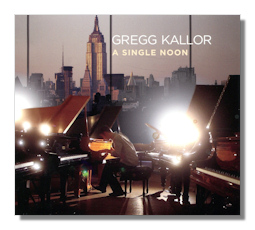
The Internet's Premier Classical Music Source
Related Links
- Latest Reviews
- More Reviews
-
By Composer
-
Collections
DVD & Blu-ray
Books
Concert Reviews
Articles/Interviews
Software
Audio
Search Amazon
Recommended Links
Site News
 CD Review
CD Review
Gregg Kallor

Piano Works
- A Single Noon
- Broken Sentences
- Night
- Straphanger's Lurch
- Found
- Espresso Nirvana
- Giants
- Things To Come
- Here Now
Gregg Kallor, piano
Single Noon Records SNR3 45m
Gregg Kallor is a New York City-based composer/pianist. Recipient of the prestigious composition accolade, the Aaron Copland Award, he has appeared at Carnegie Hall, most recently (April, 2011) to premiere this suite of nine pieces. Kallor has written a piano concerto, song cycles, chamber music and much else. He also has several recordings of his work currently available and is obviously a talent to watch.
A Single Noon suite for piano is a collection of nine pieces that depict scenes from New York City daily life, each a sort of postcard capturing a memorable impression in music. But this isn't music that is necessarily totally predetermined, as there is a measure of improvisation added by Kallor in these performances. However, a pianist wanting to perform this collection by sticking solely to the scores, can of course do so, Kallor tells us. Thus, in a concert performance Kallor – or any other pianist – might play a slightly different version of A Single Noon depending on their momentary inspiration or their decision to play only from the printed score.
Kallor's style exudes a frothy wit and nervous energy in the faster pieces, and sometimes a sentimental sort of innocence and wistfulness in the slower music. There is some toughness and muscle to it as well, and in much of Kallor's writing there is a somewhat bluesy character in the jazz elements, and now and then one also hears a bit of pop-music in the mix. If you like the music of Matt Herskowitz, an album of whose I reviewed here (Left Hand Music LHCON01) in 2001, you might well like the more subtle, slightly tarter and seemingly less protean Gregg Kallor.
The classical influences in Kallor's style, minimal though they are, would include Bartók and Prokofiev: try the quite colorful Broken Sentences (No. 2), where you'll hear jazzy snatches reminiscent of those composers' styles. The hauntingly atmospheric Night comes next and divulges a few hints of the style of Leonard Bernstein, while the ensuing piece, Straphanger's Lurch, has perhaps also a few hints, especially at the outset. The music here deftly depicts an apparent mishap on a subway when the composer failed to use the hand strap on the car to steady himself. Espresso Nirvana (No. 6), which you can hear on YouTube if you'd like to sample Kallor's style, is one of the stronger pieces here, even though it too has a few moments that vaguely evoke Bernstein (think of Symphony #2 "Age of Anxiety", Part 4). It begins busily and divulges a deftly comical kind of urgency. When the music slows down briefly the rush from the caffeine pushes it ahead again, and the "anxiety" remains right up to the end.
I should digress for a moment to dispel what might be a developing false impression about Kallor: while I may hear certain "influences" in his music, they might be regarded more as points of reference so the listener can grasp a sense of Kallor's style. Thus, I am not suggesting that he imitates someone else or displays bouts of some kind of unconscious mimicry. His music is fairly original and much of it is very inventive. That said, it doesn't always sound totally fresh either, as some of the music comes across as a little too familiar or generic or, put another way, as not always distinctive enough. Still, Kallor has enough stylistic individuality in his thematic and harmonic inventions to carve out his own personal niche.
Giants (No. 7), a mostly improvised work according to the composer, is another of the better works here. It begins ponderously and builds to a grandly triumphant conclusion. The music depicts unspecified musical "giants" the composer has known.
I've left commentary on the Emily Dickinson-inspired title piece, A Single Noon, which comes first on the disc, until the end. It features a quite memorable tune that conveys a sense of regret in its gentle quasi-sadness. It is direct and rather simple but a thoroughly inspired creation. The more I listen to this and most of the pieces in this collection, the more I sense that Kallor is a rare talent, perhaps one still developing but maybe with his best work ahead of him. The sound on the disc is excellent and Kallor's thoroughly impressive performances make probably the best case possible for his music. For those readers wanting to sample something new, this disc might be of strong interest.
Copyright © 2013, Robert Cummings




















